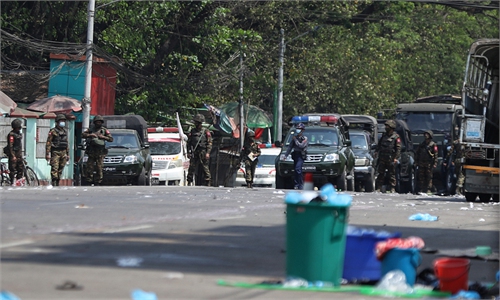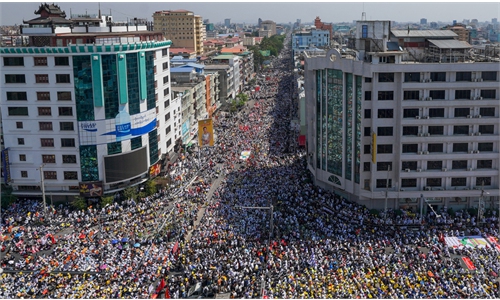To leave or not, Chinese companies are torn in the face of West-incited attacks amid Myanmar political upheaval
Upheaval dilemma
While Chinese companies have brought tangible benefits to Myanmar over recent years, the sudden political upheaval in the country since early February has cast a shadow over and brought security concerns to Chinese companies operating there. Agitated by some forces with an ulterior motive, some local radical protesters directed their anger at Chinese-funded enterprises, especially those in the garment sector, which is a pillar industry of the local economy.
The Chinese embassy in Myanmar has asked local police to take strong measures to protect the safety of Chinese businesses and employees.
In a dilemma between leaving and staying, some Chinese enterprises reached by the Global Times have ramped up efforts to prepare for unknown potential risks.
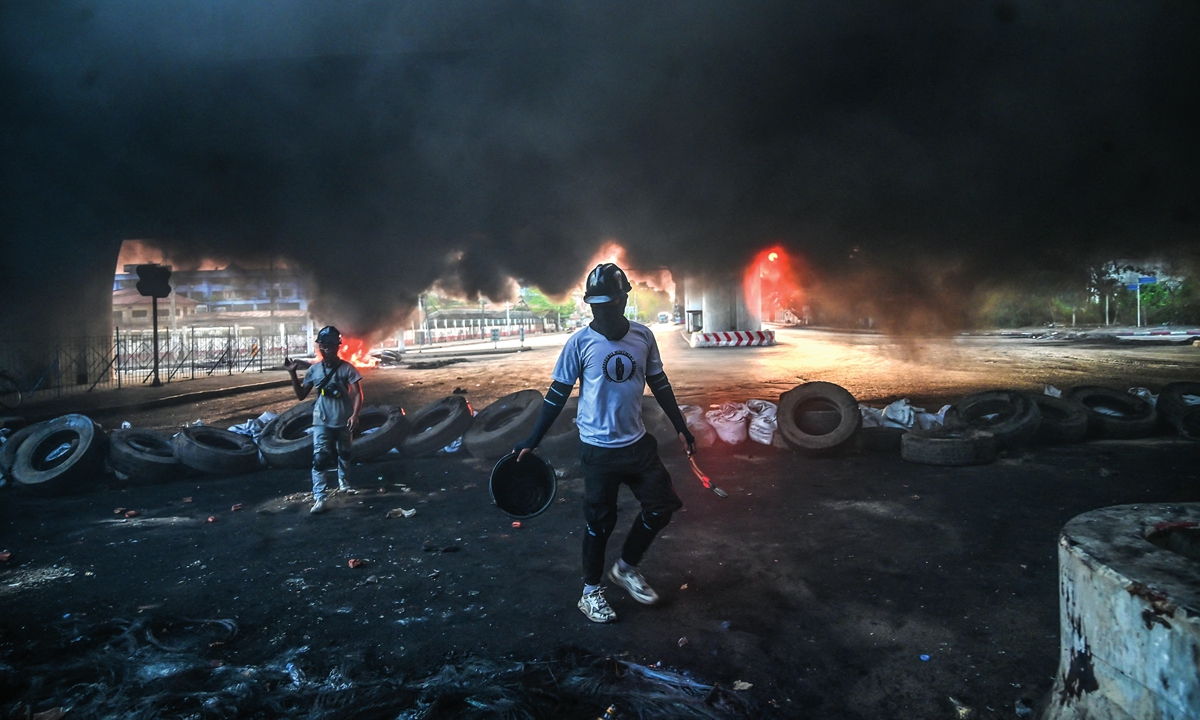
Leave or stay?
The Global Times reporter visited the Hlaingthaya Industrial Zone on the western outskirts of Yangon several years ago and discovered that the earliest industrial zone in Yangon was well-planned and constructed. Most of the factories were two or three stories, and most of the enterprises were mainly in light industries such as textile and garment making. Owners or managers of Chinese companies mostly live in villas near the industrial zones.
After Chinese factories were smashed, looted, or burned in the industrial zone recently, some have been prepared to leave amid fear. Among them, some had already been struggling with slack business due to the COVID-19 pandemic and the political upheaval, while others were disheartened by the vandalism which caused severe damages. More often than not, they feel helpless as they believe the local police cannot be of much help.
On March 16, some representatives from Chinese enterprises talked with the head of the Hlaingthaya Industrial Zone, and they said "the talks went well and both sides promised that they will strengthen the protection of Chinese enterprises and the zone will increase police presence, " the Global Times has learned.
But some representatives said it is essential for them to get prepared and take self-help measures as much as possible, as "it would take nearly half an hour at the earliest to have the police arrive after an incident is reported."
Some business leaders are still very worried about the future situation, "especially if there are serious conflicts in the next week, our personal safety will still be under threat".
Despite the situation, multiple sources with China's state-owned enterprises (SOEs) operating in Myanmar confirmed to the Global Times on Wednesday that they did not receive any official instructions to evacuate, dismissing reports that China had ordered Chinese firms to withdraw non-essential staff from Myanmar, which has been embroiled in a political crisis since February.
Currently, some Chinese workers in Myanmar returned to China several weeks ago due to the recent social and political turmoil, but some still stay at their Myanmar office, according to a manager at a Chinese SOE in the hydropower sector.
A Chinese businessman surnamed Zhang, who has been evacuated from the industrial zone due to security concerns after the incident told the Global Times that he was engaged in foreign trade of garments in China before he came to Myanmar in 2012. After visiting Bangladesh, Vietnam, and other countries, he finally chose Myanmar, mainly because the overall business environment there was relatively better.
Zhang then opened a travel agency and contracts some international conferences and exhibitions, such as the most influential textile and clothing exhibition in Myanmar.
Zhang believes that the garment manufacturing industry undoubtedly contributes more to Myanmar's economy. As far as he is aware, there are about 600 textile and garment factories in Yangon, and Chinese-funded enterprises can be said to account for "half of the industry".
In Myanmar, some estimate that there are seven or eight hundred Chinese enterprises. It is difficult to estimate their specific number in Myanmar, as some private enterprises have not been registered with the Chinese Embassy in Myanmar.
It is reported that there are more than 340 Chinese enterprises registered with the Myanmar-China Chamber of Commerce and Industry, of which 30 percent are in the textile and clothing industry.
The textile and clothing industry, which accounts for the largest share of Chinese-funded Myanmar-based businesses, is a major job creator, bringing 400,000 jobs to Myanmar.
However, being such a large job creator has made it the target of the recent rounds of attacks in serious cases of arson and vandalism.
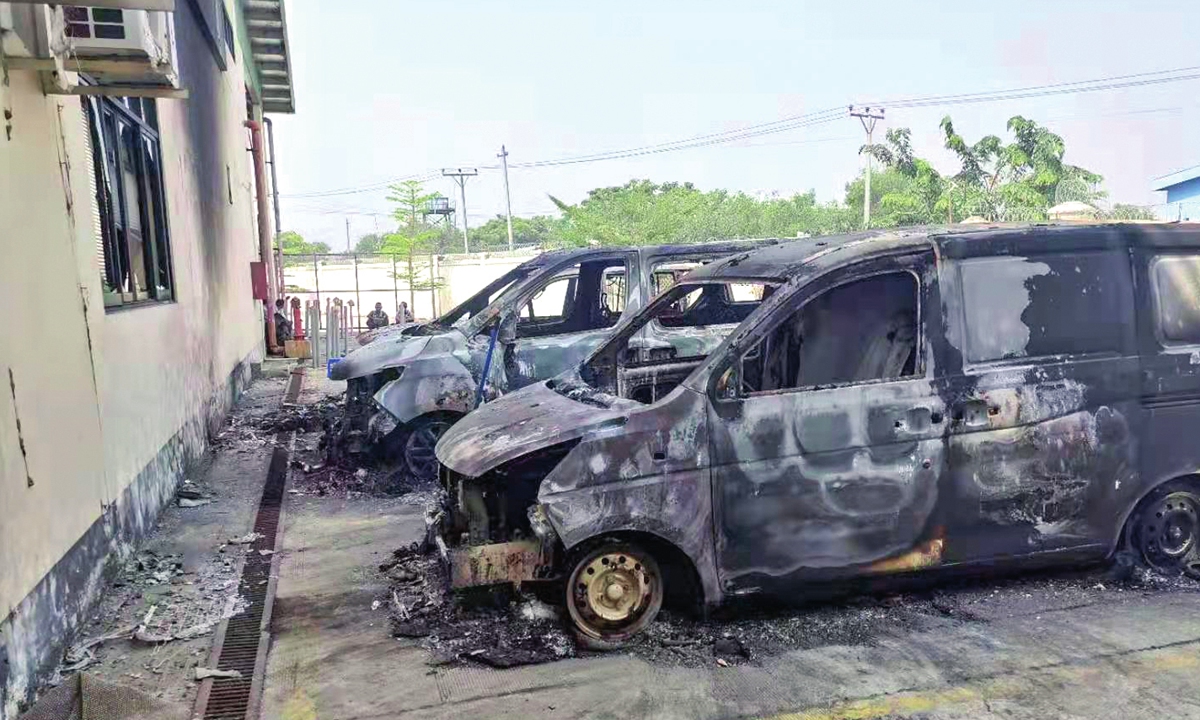
Are we enemies?
"What happened to my Myanmese friends? Are we enemies? China has invested in Myanmar for so many years, gone through thick and thin and managed to maintain a relatively good economic cooperation," a phone user said in a WeChat group in which Chinese companies keep in touch.
Another replied, "The recent violence is obviously caused by the manipulation of external forces. They hate to see peace and stability in Myanmar and are doing everything possible to provoke internal struggles among the people in Myanmar and prevent Chinese investment from operating normally."
"Although Chinese-funded enterprises have suffered heavy losses, China's policy of being friendly to all the people in Myanmar will not change. A large number of Chinese companies are staying put, and major projects have not stopped, because they are needed by Myanmese people and in line with their interests," another said.
However, more people are still worried that under the current situation, businesses cannot be carried out at all. Supermarkets and banks which are closely linked to people's livelihood are closed. Even food supplies are increasingly becoming compromised. Communication with the outside world is difficult as the mobile service networks have been cut off indefinitely.
The Global Times reporter recently contacted a businessman surnamed Liao, who came to Myanmar to engage in garment processing in 2006 and later expanded his business to the hotel and services industries.
Liao recalled that "When I first came to Myanmar, many people could not find a good job. I remember that the monthly income of many Myanmar people was basically around 115 yuan ($17.69), and the local Chinese translators in Myanmar could earn about 200-300 yuan monthly.
Various Chinese companies have made contributions to Myanmar in recent years. In addition to increasing the income of many Myanmar people, they have also donated money and materials during natural disasters, and have done a lot of charity work in Myanmar.
According to Liao, due to the impact of the pandemic, some of his hotels and entertainment venues had been closed before the political turmoil occurred. The clothing factory could not be closed in such a short period due to a large number of workers involved.
He said that foreign businessmen who are only engaged in trade or low-cost investment are prepared to leave Myanmar temporarily. But for entrepreneurs who have fixed-asset investments such as land and factories, it is not easy to withdraw. Therefore, some companies will continue to wait and closely follow the development of the situation in Myanmar.
Some pessimists said, "If the relationship between the military and the National League for Democracy (NLD) cannot be reconciled, Chinese companies investing in Myanmar will become innocent victims."
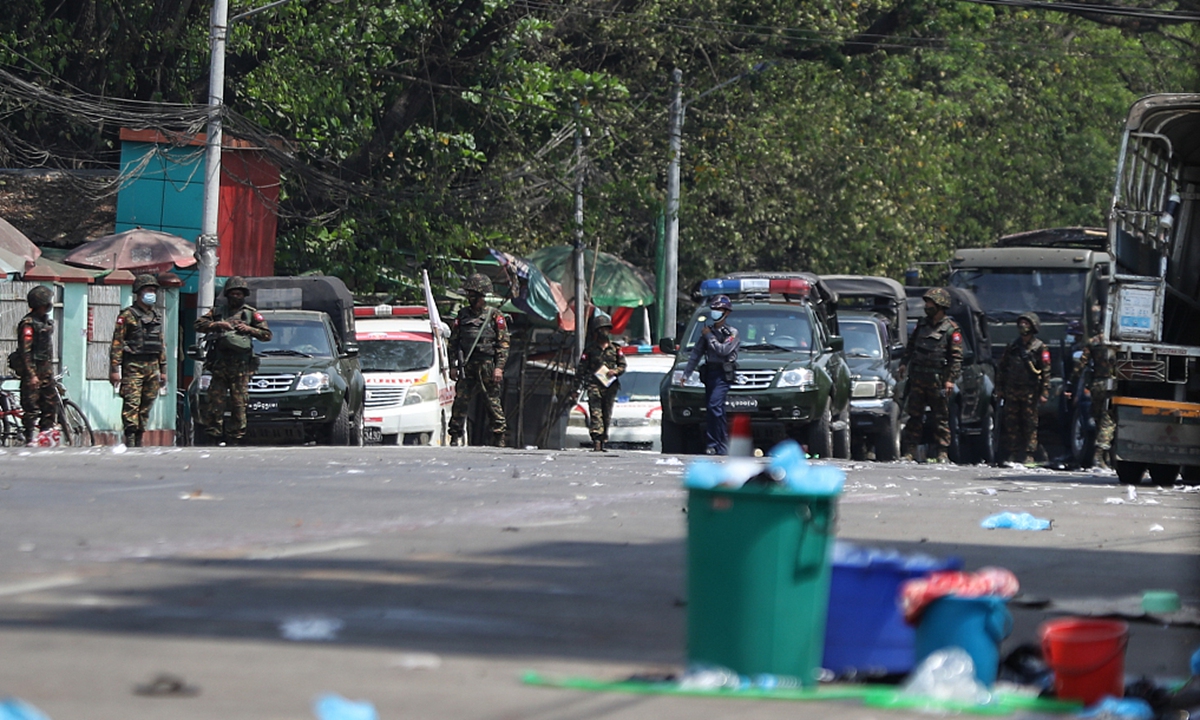
Affecting foreign investment
A total of 51 countries and regions had invested in Myanmar by the end of November 2020, with Singapore, China, and Thailand leading in the amount of investments, the New Light of Myanmar reported.
According to the World Bank's Doing Business 2020 report, Myanmar ranked 165th out of 190 global economies in terms of the ease of doing business, up six places from the 171st in 2019, one of the top 20 countries for improving performance. It rose to 70th from 152nd in 2018 for the ease of starting a business.
As the business environment in Myanmar relaxes, it is easier for Chinese companies to enter Myanmar in all aspects. However, to avoid risk, some Chinese companies have invested in Myanmar either through Singapore or as Singaporean companies. So, the stock of Chinese investment in Myanmar is higher than the actual figure. Similarly, investment from some European countries has also entered Myanmar via Singapore.
China's investment in large projects in Myanmar slowed in September 2011 after then-President U Thein Sein abruptly and unilaterally announced that the Myitsone hydropower project involving Chinese companies would be suspended during his term in office.
Some Western countries have been envious of Chinese-Myanmar economic and trade ties in recent years.
The Diplomat said in an article titled "Beijing's New Toys in Myanmar" on January 11, China has won almost all of Myanmar's solar power plant projects and continues to dominate the sector. China provides the technology, while local joint venture partners secure the land on which to construct the solar plants.
However, Western public opinion found that developed countries have promised more but do less in Myanmar in recent years, which has disappointed the government and people of Myanmar. Therefore, they accept and choose to cooperate with China more.
Global Times learned from managers of the Chinese enterprises in Myanmar and relevant scholars that some Myanmar people take Chinese factories as "hostages," dragging the Chinese enterprises in Myanmar's political infighting. It is very unfair for Chinese enterprises and will surely affect Myanmar's business environment and dampen the enthusiasm of other countries to invest in Myanmar.
South Korean companies, including those in the garment industry, have been increasing their investments in Myanmar during the NLD's years in power. Thailand, Japan, and other countries have also set up industrial parks in Myanmar.
Fast Retailing Co., which owns casual clothing brands such as Uniqlo and GU, announced on March 16 that two of its partner factories in Yangon were also set on fire, Japanese media NHK reported. The overseas security website of Japan's Foreign Ministry issued a security alert warning against the situation in Myanmar on March 9.
Xu suggested that when Chinese companies encounter situations such as political changes in foreign countries, they should do a good job of evaluating risks and have a corresponding risk response mechanism. In addition, it's better to learn how to disperse the risk, such as considering inviting a third party in some large projects. In Myanmar, third-party cooperation with Singapore and other ASEAN countries can be considered for some projects to complement each other's strengths.
The Chinese embassy in Myanmar has asked local police to take strong measures to protect the safety of Chinese businesses and employees.
In a dilemma between leaving and staying, some Chinese enterprises reached by the Global Times have ramped up efforts to prepare for unknown potential risks.

Protesters walk amidst smoke near a makeshift barricade in Yangon on March 16. Photo: AFP
Leave or stay?
The Global Times reporter visited the Hlaingthaya Industrial Zone on the western outskirts of Yangon several years ago and discovered that the earliest industrial zone in Yangon was well-planned and constructed. Most of the factories were two or three stories, and most of the enterprises were mainly in light industries such as textile and garment making. Owners or managers of Chinese companies mostly live in villas near the industrial zones.
After Chinese factories were smashed, looted, or burned in the industrial zone recently, some have been prepared to leave amid fear. Among them, some had already been struggling with slack business due to the COVID-19 pandemic and the political upheaval, while others were disheartened by the vandalism which caused severe damages. More often than not, they feel helpless as they believe the local police cannot be of much help.
On March 16, some representatives from Chinese enterprises talked with the head of the Hlaingthaya Industrial Zone, and they said "the talks went well and both sides promised that they will strengthen the protection of Chinese enterprises and the zone will increase police presence, " the Global Times has learned.
But some representatives said it is essential for them to get prepared and take self-help measures as much as possible, as "it would take nearly half an hour at the earliest to have the police arrive after an incident is reported."
Some business leaders are still very worried about the future situation, "especially if there are serious conflicts in the next week, our personal safety will still be under threat".
Despite the situation, multiple sources with China's state-owned enterprises (SOEs) operating in Myanmar confirmed to the Global Times on Wednesday that they did not receive any official instructions to evacuate, dismissing reports that China had ordered Chinese firms to withdraw non-essential staff from Myanmar, which has been embroiled in a political crisis since February.
Currently, some Chinese workers in Myanmar returned to China several weeks ago due to the recent social and political turmoil, but some still stay at their Myanmar office, according to a manager at a Chinese SOE in the hydropower sector.
A Chinese businessman surnamed Zhang, who has been evacuated from the industrial zone due to security concerns after the incident told the Global Times that he was engaged in foreign trade of garments in China before he came to Myanmar in 2012. After visiting Bangladesh, Vietnam, and other countries, he finally chose Myanmar, mainly because the overall business environment there was relatively better.
Zhang then opened a travel agency and contracts some international conferences and exhibitions, such as the most influential textile and clothing exhibition in Myanmar.
Zhang believes that the garment manufacturing industry undoubtedly contributes more to Myanmar's economy. As far as he is aware, there are about 600 textile and garment factories in Yangon, and Chinese-funded enterprises can be said to account for "half of the industry".
In Myanmar, some estimate that there are seven or eight hundred Chinese enterprises. It is difficult to estimate their specific number in Myanmar, as some private enterprises have not been registered with the Chinese Embassy in Myanmar.
It is reported that there are more than 340 Chinese enterprises registered with the Myanmar-China Chamber of Commerce and Industry, of which 30 percent are in the textile and clothing industry.
The textile and clothing industry, which accounts for the largest share of Chinese-funded Myanmar-based businesses, is a major job creator, bringing 400,000 jobs to Myanmar.
However, being such a large job creator has made it the target of the recent rounds of attacks in serious cases of arson and vandalism.

Cars are burned down at a China-invested factory in Yangon, Myanmar. Photo: Interviewee
Are we enemies?
"What happened to my Myanmese friends? Are we enemies? China has invested in Myanmar for so many years, gone through thick and thin and managed to maintain a relatively good economic cooperation," a phone user said in a WeChat group in which Chinese companies keep in touch.
Another replied, "The recent violence is obviously caused by the manipulation of external forces. They hate to see peace and stability in Myanmar and are doing everything possible to provoke internal struggles among the people in Myanmar and prevent Chinese investment from operating normally."
"Although Chinese-funded enterprises have suffered heavy losses, China's policy of being friendly to all the people in Myanmar will not change. A large number of Chinese companies are staying put, and major projects have not stopped, because they are needed by Myanmese people and in line with their interests," another said.
However, more people are still worried that under the current situation, businesses cannot be carried out at all. Supermarkets and banks which are closely linked to people's livelihood are closed. Even food supplies are increasingly becoming compromised. Communication with the outside world is difficult as the mobile service networks have been cut off indefinitely.
The Global Times reporter recently contacted a businessman surnamed Liao, who came to Myanmar to engage in garment processing in 2006 and later expanded his business to the hotel and services industries.
Liao recalled that "When I first came to Myanmar, many people could not find a good job. I remember that the monthly income of many Myanmar people was basically around 115 yuan ($17.69), and the local Chinese translators in Myanmar could earn about 200-300 yuan monthly.
Various Chinese companies have made contributions to Myanmar in recent years. In addition to increasing the income of many Myanmar people, they have also donated money and materials during natural disasters, and have done a lot of charity work in Myanmar.
According to Liao, due to the impact of the pandemic, some of his hotels and entertainment venues had been closed before the political turmoil occurred. The clothing factory could not be closed in such a short period due to a large number of workers involved.
He said that foreign businessmen who are only engaged in trade or low-cost investment are prepared to leave Myanmar temporarily. But for entrepreneurs who have fixed-asset investments such as land and factories, it is not easy to withdraw. Therefore, some companies will continue to wait and closely follow the development of the situation in Myanmar.
Some pessimists said, "If the relationship between the military and the National League for Democracy (NLD) cannot be reconciled, Chinese companies investing in Myanmar will become innocent victims."

Myanmar Photo:VCG
Affecting foreign investment
A total of 51 countries and regions had invested in Myanmar by the end of November 2020, with Singapore, China, and Thailand leading in the amount of investments, the New Light of Myanmar reported.
According to the World Bank's Doing Business 2020 report, Myanmar ranked 165th out of 190 global economies in terms of the ease of doing business, up six places from the 171st in 2019, one of the top 20 countries for improving performance. It rose to 70th from 152nd in 2018 for the ease of starting a business.
As the business environment in Myanmar relaxes, it is easier for Chinese companies to enter Myanmar in all aspects. However, to avoid risk, some Chinese companies have invested in Myanmar either through Singapore or as Singaporean companies. So, the stock of Chinese investment in Myanmar is higher than the actual figure. Similarly, investment from some European countries has also entered Myanmar via Singapore.
China's investment in large projects in Myanmar slowed in September 2011 after then-President U Thein Sein abruptly and unilaterally announced that the Myitsone hydropower project involving Chinese companies would be suspended during his term in office.
Some Western countries have been envious of Chinese-Myanmar economic and trade ties in recent years.
The Diplomat said in an article titled "Beijing's New Toys in Myanmar" on January 11, China has won almost all of Myanmar's solar power plant projects and continues to dominate the sector. China provides the technology, while local joint venture partners secure the land on which to construct the solar plants.
However, Western public opinion found that developed countries have promised more but do less in Myanmar in recent years, which has disappointed the government and people of Myanmar. Therefore, they accept and choose to cooperate with China more.
Global Times learned from managers of the Chinese enterprises in Myanmar and relevant scholars that some Myanmar people take Chinese factories as "hostages," dragging the Chinese enterprises in Myanmar's political infighting. It is very unfair for Chinese enterprises and will surely affect Myanmar's business environment and dampen the enthusiasm of other countries to invest in Myanmar.
South Korean companies, including those in the garment industry, have been increasing their investments in Myanmar during the NLD's years in power. Thailand, Japan, and other countries have also set up industrial parks in Myanmar.
Fast Retailing Co., which owns casual clothing brands such as Uniqlo and GU, announced on March 16 that two of its partner factories in Yangon were also set on fire, Japanese media NHK reported. The overseas security website of Japan's Foreign Ministry issued a security alert warning against the situation in Myanmar on March 9.
Xu suggested that when Chinese companies encounter situations such as political changes in foreign countries, they should do a good job of evaluating risks and have a corresponding risk response mechanism. In addition, it's better to learn how to disperse the risk, such as considering inviting a third party in some large projects. In Myanmar, third-party cooperation with Singapore and other ASEAN countries can be considered for some projects to complement each other's strengths.
